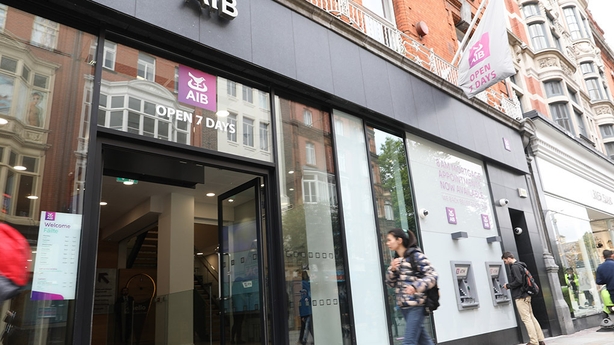AIB is to deploy between 500 and 1,000 staff to help deal with the influx of new customers arising from the impending departure from the Irish market of Ulster Bank and KBC Bank Ireland.
Chief executive Colin Hunt said 300 of those would be redeployed internally while the remainder would be recruited on a temporary basis.
Mr Hunt said the changes in the banking market represent a huge opportunity for AIB.
"Here we have an opportunity to welcome in hundreds of thousands of new customers and I want to ensure and everybody working in AIB wants to ensure that that process, that transition process from Ulster Bank or KBC to AIB is as friction free as possible," he told the media following the bank's AGM and the publication of a first quarter trading update.
"It is a huge lift for the organisation and I am not going to try to understate the size of the lift, but we are going to deploy the resources to make that as pain free as possible because it is a massive opportunity for us in the medium and long-term."
Up to a million Ulster Bank and KBC account holders will have to either switch or close their accounts over the coming months, leading to concern about the pressure on the receiving banks.
However, Mr Hunt rejected a suggestion that the sector has been slow to react and prepare for the massive movement of customers.
He said the banks have been thinking about it for quite some time, as has the regulator and they are now in the "action part" of the process.
The bank has seen a very significant increase in account opening activity this year, he added, with around 84,000 new accounts opened during the first quarter of the year, compared to 210,000 for the whole of last year.
"So we are already seeing that customer impact, we are already seeing customers making the move to AIB and those numbers are inevitably going to increase as the year progresses," he said.
The Competition and Consumer Protection Commission recently sounded a warning about the impact that Ulster Bank’s departure would have on wider competition in the banking market.
However, Mr Hunt said there are fewer mortgage providers in the market now than in 2006 and 2007 and yet rates are lower.
He added that there had been a number of rate reductions since the Ulster Bank and KBC exit announcements as well as a number of new entrants in the financial services market.
"There is plenty of competition in Irish financial services," he claimed.

Regarding growing pressure on the Government to re-examine the pay restrictions on bankers, Mr Hunt said the bank has been operating under the restrictions for 10 years or more at this stage and it is imposing a restraint.
"It does limit our ability to compete in the labour market, it does have an impact on our ability to recruit, attract and retain staff," he said.
Asked what it would mean for AIB if Bank of Ireland were to have its remuneration restrictions removed later this year if the State's shareholding in the bank is sold down completely, Mr Hunt said it would be very challenging for AIB in the labour market if one significant competitor had flexibility in terms of how people are remunerated that was of a different magnitude.
On the issue of AIB’s review of its EBS operations, Mr Hunt said it is ongoing and will conclude next year.
He said once it is complete the bank will communicate with customers.
Mr Hunt added that it is a very important part of the AIB group franchise.
AIB is currently in the process of negotiating a deal to buy around €6bn of Ulster Bank’s performing tracker mortgages.
Mr Hunt said it had been AIB’s objective to pursue the Ulster Bank tracker book once it announced it was leaving the Republic of Ireland market.
"It allows us to welcome a significant number of customers in a core product in our core market and that is why we engaged in a process with NatWest that led to last week’s announcement, and we are hopeful that we will conclude those negotiations in the not too distant future," he said.
He said there would be no staff transferring with the tracker mortgage book if the negotiations are successful, something he said he hoped would be achieved before the end of the first half of the year.
Earlier the AGM heard criticism from a number of shareholders about the bank's customer services, including call waiting times and in-branch issues.
One shareholder, Brendan Ryan, was also critical of the bank’s handling of the fallout from the failed Belfry Funds and asked what progress had been made in relation to the payment of compensation to those who lost money.
AIB Group General Counsel, Helen Dooley, said it had taken longer than anticipated to collect files, engage with stakeholders and work within the regulatory framework in order to devise a redress programme.
She said all 2,500 investors would be considered for the programme and it is hoped that the bank will be in communication with them before September.
Shareholder Brendan Burgess also criticised the bank’s handling of the tracker mortgage controversy, describing it as deeply disappointing.
He called on new chairman, Jim Pettigrew, to try to change the culture of the bank, and added that he hoped that the new Ulster Bank tracker customers will not be treated in the same way if AIB’s proposed deal to buy the book goes ahead.
Mr Pettigrew said he could not comment on the past but assured Mr Burgess that customer care is absolutely at the heart of the organisation.
Mr Hunt said that the bank is committed to resolving the tracker issue once and for all and to the satisfaction of the Central Bank, hopefully this year.







